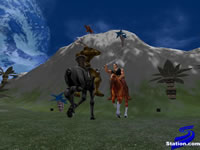| |
Site Navigation
Main
News
Forums
Games
Games Database
Top 100
Release List
Support Files
Features
Reviews
Previews
Interviews
Editorials
Diaries
Misc
Download
Gallery
Music
Screenshots
Videos
Miscellaneous
Staff Members
Privacy Statement
|
|
Eric Dallaire answers further questions about the SPECIAL system in an interview at Duck And Cover. The first part was published in August, you can find the newsbit here. This is a snip about whether the SPECIAL system is good for fantasy RPG's or not:
2.) Do you think SPECIAL is a good character system for fantasy? RPGs? How would you relate it to other fantasy character systems?
I think SPECIAL is a great rules set for a fantasy RPG, primarily because it provides the most flexible system for creating characters. The traits alone allow you a great deal of customization. Since each trait grants you a positive and negative, you have more substance to your character, since that character has some flaws or vulnerabilities, something the player can roleplay with.
Also, the attributes elegantly cover any and all aspects that a fantasy game would need. Most fantasy RPGs adhere closely to the classic level up structure and reward the player model, and in that regard SPECIAL really shines. The skill point system is a perfect way to build your character, allowing you to control the development every step of the way. And the perk system is fantastic, as an exceptional reward for the player and as another way to differentiate your character from others.
If I had to compare it to another system, I suppose the d20 system used for Dungeons and Dragons products like Icewind Dale II would be the obvious choice. Third Edition is a good class-based system. However, I think another great strength of the Fallout system is allowing players to create a character without a class, to determine the progression on a per level basis. Although Third Edition is a huge improvement from the pure class system of previous editions, allowing you to choose almost any class when you level up, characters are still bound by some restrictions to stay within classic fantasy boundaries. For instance, the favored class restriction in 3E penalizes you if you stray too far away from the classic race-class combos, like elves having a favored class of wizard, or halfings and thieves. With SPECIAL, there are no such restrictions, and you can create any number of character types with much more freedom. |
|
|





 Lionheart Interview Pt. 2 at Duck And Cover
Lionheart Interview Pt. 2 at Duck And Cover